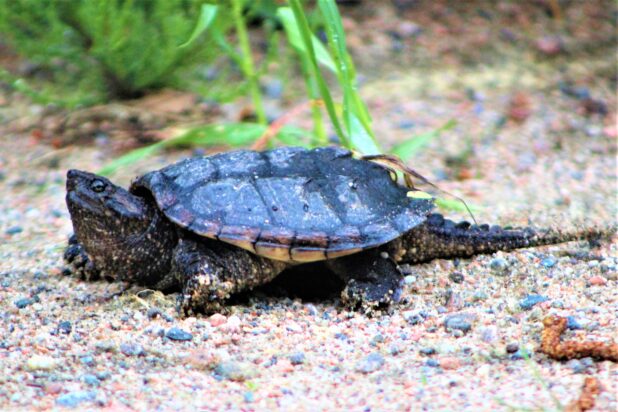Headline News
The Land Between looks to protect turtles in HH
October 14, 2020

Oct. 14, 2020
By Nate Smelle
Chief operating officer of the environmental not-for-profit The Land Between, Leora Berman, spoke with Hastings Highlands council during their meeting on Wednesday, Oct. 7 regarding the organization’s latest campaign to protect the natural environment. For more than two decades, Berman has been working diligently to protect the fragile and ecologically essential ecosystems supporting all life in Ontario’s cottage country. As founder of The Land Between, she has been instrumental in seeing this work through from start to finish. Her reason for speaking with council on this day was one of the organization’s current initiatives to help protect one of cottage country’s most beloved, important, and threatened inhabitants … turtles.
Berman explained that because turtles are most negatively effected by roads, the number one threat to turtle populations is road traffic. Unable to avoid oncoming traffic as quickly as mammals and birds, she said turtle populations have already been diminished in Ontario by 70 per cent. Noting how turtles are a “keystone species” Berman highlighted the importance of these species, and the many threats to their survival. While beaver are responsible for 84 per cent of the water on the land in Ontario, she said turtles are responsible for cleaning that water. Explaining to council why the group is focusing their attention on turtles, Berman said “Keystone species actually hold up an entire ecosystem. So, turtles are not just cute animals that are interesting, and they certainly don’t reproduce like roads. Turtles are essential to all our aquatic ecosystems. They spread seeds like birds, they cycle nutrients. When turtles disappear these ecosystem collapse and that’s why there is so much buzz about turtles.”
To help ensure the survival of Ontario’s eight species of turtles, Berman said The Land Between is seeking the support of Hastings Highlands council for a mitigation initiative at a wildlife hot spot in the municipality. Specifically, she said they are looking for the municipality’s permission to move forward with installing fencing at a high-risk crossing zone on Musclow-Greenview Road.
In a study conducted along a 31 kilometre stretch of the 1,000 Islands Parkway, a road similar to those found in North Hastings, Berman said more than 24,000 collisions with turtles and other small vertebrates were reported over just a five month period. She said these collisions often cause indirect damage, personal injury, or even fatality. As awareness of the crucial role that turtles play in the maintenance of aquatic ecosystems health grows, Berman said there is evidence that more people have been either stopping to assist them, or swerving to avoid them as they cross the road. In turn, she said this also increases the level of risk people are exposing themselves to for the sake of turtles, while making it even more important to provide turtles with safe passage across dangerous roads.
Explaining further why they need to be protected, Berman said “Turtles have low survivorship of their offspring, which means that one in 1,000 eggs will reach adulthood to replace a turtle. That means it can take from at least 20 years up to 60 years for one adult turtle to be replaced in the environment. They also use the roads for nesting, so that increases the mortality rate in the hatchlings. It means that the roads are the most threatening thing to these species. If we lose 20 per cent of snapping turtles for instance, they will be extinct in 20 years. That’s how vulnerable the species is, and that’s how close we are to the collapsing of our aquatic ecosystems.”
Because wildlife collisions are increasing, Berman said the Ministry of Transportation of Ontario is developing a wildlife mitigation strategy that includes data collection, wildlife hot spot mapping, and the installation of state of the art mitigation measures such as turtle tunnels and fencing. With council’s approval, she said Hastings Highlands can join the list of several other municipalities taking action to protect turtles and the environment. To help make a difference, she said The Land Between would like to install fencing to prevent wildlife collisions at a turtle crossing hot spot on Musclow-Greenview Road. Making the conservation initiative even more appealing to council, Berman said The Land Between will cover the entire cost of the materials and installation. In addition, she said they plan to monitor the site prior to and after the installation to observe the project’s effectiveness.
Council is now reviewing the information provided by Berman and The Land Between, and considering whether to support the initiative.


















